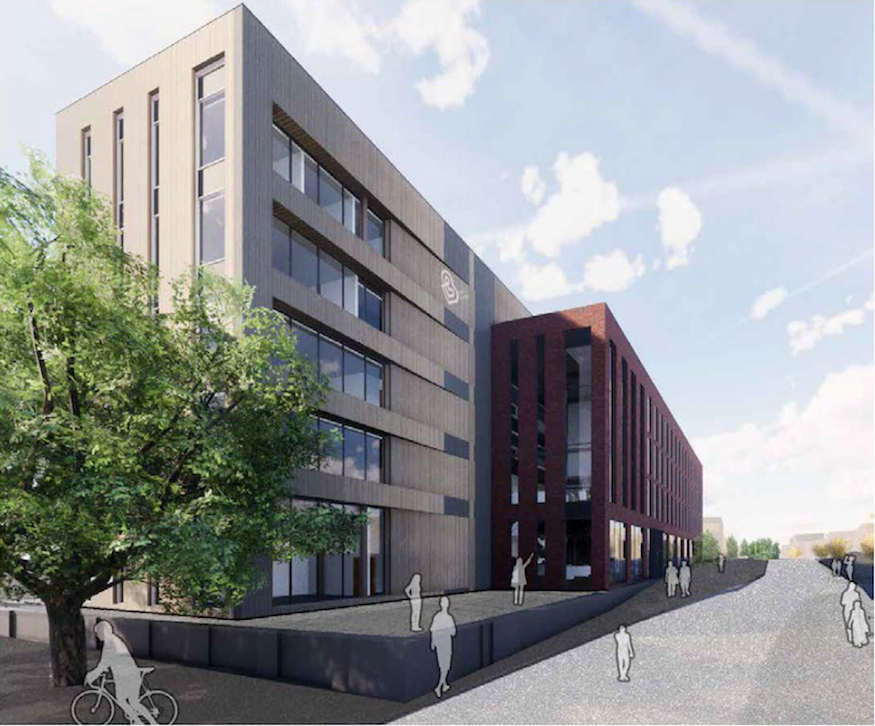Proposed Bolton College of Medical Sciences will transform health sector workforce development

Bolton, and the Greater Manchester region, could lead the way in transforming how NHS workforces are trained in the UK, if plans for the new Bolton College of Medical Sciences (BCMS) get the green light
The proposed Bolton College of Medical Sciences will help transform the way health and social care education and training is provided in Greater Manchester, alleviating staffing pressures, resulting in an improved overall level of care and preparing a highly skilled workforce to meet the challenges of the future.
The proposed facility, which is expected to go to planning on 27th June, is a joint partnership initiative between Bolton College, the University of Bolton, Bolton Council, and Bolton NHS Foundation Trust. Located at the site of the Royal Bolton Hospital in Farnworth, BCMS will provide state-of-the-art skills and training facilities for both new learners and existing staff. It will offer a blend of on-the-job training and vocational skills training, to broaden access to the health and social care curriculum for local people, as well as for existing health and care sector workers.
BCMS will also offer apprenticeships, enabling learners to gain qualifications that can lead to a range of roles across the health and social care spectrum, from healthcare assistant level up to nursing and advanced health and care levels.
Provision is set to include physician associates, advanced practitioners, trainee nurse associates, assistant practitioners, care leadership & management, healthcare science technician and health care support. The curriculum has been designed to widen access to careers in the clinical and medical health and social care sectors, while supporting learners in reaching the highest levels of the care professions.
For new learners, BCMS will offer an alternative and direct route into the clinical health and care professions from the “traditional”, academic pathways, focusing on practical skills-based learning in a live hospital environment. It will provide opportunities to reach all levels of clinical care. For existing healthcare professionals and NHS staff, on-site training opportunities will make upskilling more accessible and significantly improve in-work career progression. The facility is set to become a model for the future of health and social care skills and training development across GM and beyond.
The curriculum will be jointly delivered by teaching staff at Bolton College, the University of Bolton and NHS clinical professionals, including senior healthcare staff from Bolton NHS Foundation Trust and beyond. This will help to help bridge the gap between training and real-world expectations. Learners will also have access to the latest qualifications and developments in both teaching and medical technology, with the potential for simulation suites, MRI scanning, radiology, and surgical and acute care training environments.
In total, BCMS is expected to create 20,000 apprenticeships and welcome over 60,000 learners in the first 20 years. It will contribute approximately £150 million to the local economy.
The learning facility aims to address the critical staffing shortfalls faced by the healthcare sector across GM and nationally, reducing reliance on external healthcare recruitment agencies, fees to which are estimated to cost up to £50m per year across GM. Greater Manchester has one of the largest shortages of NHS clinical services staff of any NHS region. It will also provide a future-proofed workforce, and ensure health services in Bolton do not suffer from succession problems caused by an ageing healthcare workforce in Greater Manchester.
Together with the recent £9 million transformation of the hospital’s accident and emergency department – the busiest in Greater Manchester – it will transform the provision of healthcare services in the town. It will also build on Bolton NHS Foundation Trust’s reputation as a provider of enhanced training opportunities, having recently trained one of the first cohorts of nursing associates in the country, in partnership with the University of Bolton. The two-year course saw 20 former healthcare associates become qualified nurse practitioners.
Dr Jackie Bene, Chief Executive of Bolton NHS Foundation Trust, said:
“This innovative new medical sciences college will provide a home grown health workforce for the future. It is a very exciting project.”
Subject to planning permission, BCMS is expected to welcome its first intake of learners in 2022. In addition to the facility itself, a new, dedicated multi-storey car park will be built to accommodate learners, staffs and visitors, helping to alleviate existing parking pressures at the hospital site. Dedicated public transport and especially designed curriculum timings will also help to avoid additional car traffic during peak times, minimising any transport or traffic issues.
Kondal Reddy Kandadi, Deputy Vice Chancellor of the University of Bolton, said:
“This is a transformative strategic initiative, which will offer next generation learning and, crucially, address a skills gap in a variety of areas of healthcare, at the same time alleviating staffing pressures on the NHS.”
The £30 million funding for the building of the facility will be provided by the University of Bolton Group, Bolton Council, and the Greater Manchester Combined Authority (GMCA).
Cllr Sean Fielding, GMCA Lead for Employment, Skills and Apprenticeships, said:
“This project is the first of its kind for Greater Manchester, and will mean that the demand for nursing and medical services will be better met going forward. The Bolton College of Medical Science has been designed to be an exemplar health facility in Greater Manchester, both in terms of training and recruitment of staff, and level of care provided.”
BCMS will form a key part of the ambitious Bolton 2030 vision outlined by Bolton Council, which aims to improve the health and wellbeing of residents, as well as provide enhanced employment prospects for the local community.











Responses